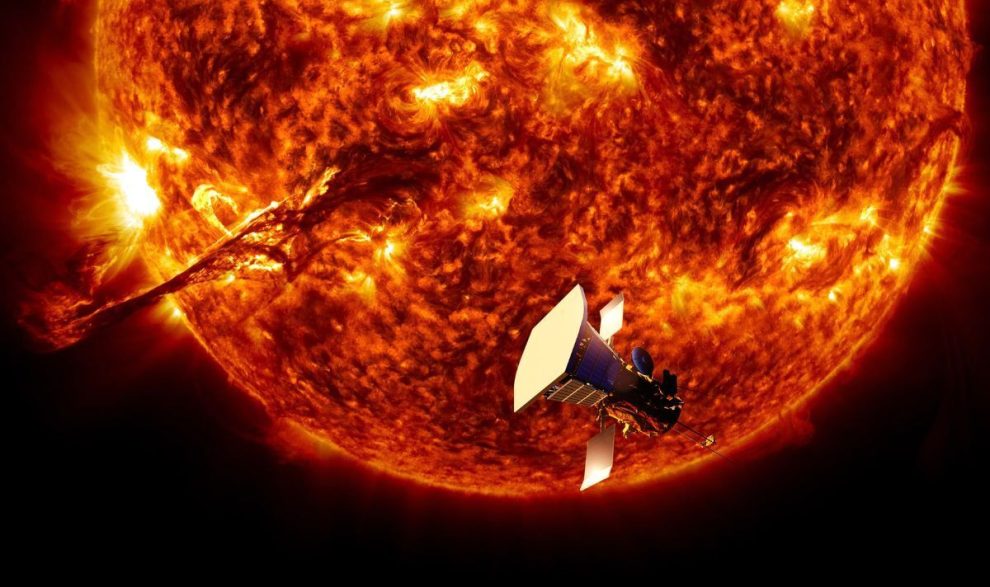In today’s digital age, the internet has become an indispensable part of our daily lives. From communication and entertainment to work and education, we rely on the internet for virtually everything. But have you ever considered what would happen if the internet suddenly went down? This alarming scenario is precisely what scientists at George Mason University are striving to prevent, thanks to a groundbreaking grant from the U.S. Navy.
The Threat of Solar Activity
The research, funded by the Navy grant, focuses on understanding and mitigating the impact of solar activity on Earth’s communication systems. Solar flares and other violent solar events can wreak havoc on our technological infrastructure, disrupting radio and internet communications, GPS, and even the electric power grid. The scientists fear that a particularly large solar flare could potentially knock out the internet for weeks or months, triggering a global recession.
To tackle this critical issue, the Mason scientists are collaborating with the Naval Research Laboratory. By employing a multifaceted approach, including computer modeling, laboratory experiments, and field observations, the researchers aim to gain a comprehensive understanding of how solar activity affects our communication systems. This knowledge will be instrumental in developing effective strategies to protect our digital infrastructure from the devastating effects of solar events.
The Vital Role of the Internet
The internet has revolutionized the way we live, work, and interact with one another. It has connected people from all corners of the globe, enabling the rapid exchange of information and ideas while providing access to an unparalleled wealth of resources. Moreover, the internet serves as the backbone of the global economy, facilitating business transactions, customer communication, and supply chain management. Governments also rely on the internet to deliver essential services to citizens and businesses.
Given the internet’s crucial role in our modern world, the consequences of a prolonged internet outage would be catastrophic. Businesses would grind to a halt, and governments would struggle to provide basic services. The resulting economic fallout would be felt on a global scale, highlighting the urgent need for robust protection against solar activity.
Safeguarding Our Communication Systems
To fortify our communication systems against the threats posed by solar activity, several key strategies are being explored:
- Developing resilient technologies: Scientists are working to create new technologies that can withstand the disruptive effects of solar activity. By engineering hardware and software solutions that are more resistant to electromagnetic interference, we can enhance the overall resilience of our communication systems.
- Hardening existing infrastructure: In addition to developing new technologies, efforts are being made to strengthen existing infrastructure. This involves implementing protective measures such as shielding, redundancy, and failsafe mechanisms to minimize the impact of solar events on our current communication networks.
- Establishing emergency preparedness plans: Comprehensive emergency plans and preparedness measures are essential for mitigating the potential fallout from a solar-induced internet outage. By proactively developing contingency plans and educating the public about the risks, we can ensure a more coordinated and effective response in the event of a crisis.
The Path Forward
As we become increasingly reliant on the internet and digital technologies, it is crucial that we address the looming threat of solar activity. The pioneering research being conducted by George Mason University scientists, in collaboration with the U.S. Navy, represents a significant step forward in safeguarding our communication systems and, by extension, our way of life.

By investing in the development of resilient technologies, hardening our existing infrastructure, and establishing robust emergency preparedness plans, we can build a more secure and sustainable digital future. The stakes are high, but with the dedication and expertise of our scientific community, we have the power to protect the internet and ensure its vital role in our lives for generations to come.
Frequently Asked Questions
1. What is solar activity, and how can it affect the internet?
Solar activity refers to the various phenomena that occur on the sun’s surface, such as solar flares and coronal mass ejections. These events can release large amounts of electromagnetic radiation and charged particles into space, which can interfere with Earth’s communication systems, including the internet. In severe cases, solar activity can disrupt radio and internet communications, GPS, and even cause damage to satellites and the electric power grid.
2. Why is the research being conducted by George Mason University scientists important?
The research being conducted by George Mason University scientists, in collaboration with the U.S. Navy, is crucial for understanding the impact of solar activity on our communication systems and developing strategies to protect them. By studying the effects of solar events through computer modeling, laboratory experiments, and field observations, the researchers can gain valuable insights into how to create more resilient technologies, harden existing infrastructure, and establish effective emergency preparedness plans. This research is essential for safeguarding the internet and ensuring its continued availability and reliability in the face of solar threats.
3. What can individuals do to prepare for a potential solar-induced internet outage?
While the research being conducted aims to protect our communication systems on a large scale, individuals can also take steps to prepare for a potential solar-induced internet outage. Some key actions include:
- Keeping backup copies of important documents and files in physical form or on local storage devices.
- Maintaining an emergency communication plan with family and friends, including alternative ways to stay in touch, such as through landline phones or designated meeting places.
- Staying informed about the potential risks and following the guidance of local authorities and emergency services in the event of a crisis.
By staying prepared and informed, individuals can help mitigate the personal impact of a solar-induced internet outage and contribute to a more resilient community.
Conclusion
The groundbreaking research being undertaken by George Mason University scientists, with support from the U.S. Navy, is a testament to the proactive approach being taken to address the potential threats posed by solar activity to our internet and communication systems. By developing innovative solutions and strengthening our digital infrastructure, we can work towards a future where the internet remains a reliable and integral part of our lives, even in the face of solar adversity. As we navigate the challenges of an increasingly connected world, it is essential that we prioritize the resilience and security of our communication systems, ensuring that we can continue to reap the benefits of the digital age for years to come.
















Add Comment